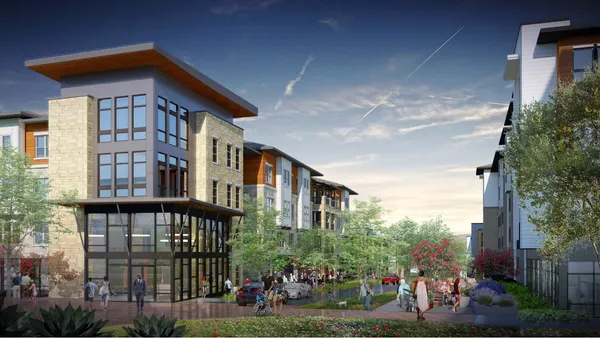Dive Brief:
- Six cities outside Denver sued the state of Colorado to block a pair of laws forcing communities to reform local land-use restrictions to allow for more housing construction, claiming the legislation violates their home rule rights.
- The lawsuit follows a May 16 executive order signed by Colorado Gov. Jared Polis that ties distribution of more than $100 million in state funding for cities and towns to whether they complied with laws passed during the 2024 and 2025 legislative sessions to address the statewide housing shortage.
- Colorado is one of several states facing pushback from cities and towns that are resisting state-mandated housing reforms.
Dive Insight:
Cities and states throughout the U.S. have reformed local zoning and land-use laws in recent years to allow for construction of multifamily developments to help address the nationwide shortage of available units that have contributed to high housing prices.
California filed a lawsuit against Huntington Beach in 2023 for violating state laws that require cities to plan for a certain number of housing units to be built. On Friday, California’s attorney general issued a legal bulletin warning cities and counties they could face fines between $10,000 and $50,000 per month if they obstruct lawful housing projects.
Several towns in Massachusetts also sued the state over a law that forces communities within the state’s transit system service area to amend their zoning laws to allow multifamily housing, saying the state didn’t provide proper funding for communities to meet its requirements.
In Colorado, Polis’ executive order essentially informed cities that they could lose out on millions in state funding if they don’t comply with several state laws aimed at encouraging more housing, including the two 2024 laws that were the target of the lawsuit filed in Denver District Court on May 19 by Greenwood Village, Lafayette, Westminster, Arvada, Glendale and Aurora.
One of the laws bans cities from enforcing or enacting land use regulations that set minimum parking standards for multifamily developments. The other law requires communities that are served by public transit to designate areas that allow denser residential housing and ensure their land use laws allow them to meet certain housing opportunity goals.
“The cost of housing is a statewide issue,” Polis stated in the executive order. Though many communities have pursued local actions, Colorado still needs more than 100,000 housing units, he added. “As such, these regional and statewide actions are critical and our success requires that all local governments comply with State law.”
But under Colorado’s constitution, cities and towns have the right to establish their own rules on local matters with public input, Rachael Kuroiwa, an Arvada spokesperson, said in an email.
Brad Rupert, an Arvada city councilmember at-large, said in a statement that Arvada joined the lawsuit because the state’s home rule rights “have been eroded by the Legislature, who want to impose one-size-fits-all centralized rules for land use.”
"This would silence local voices on some of the most impactful decisions a community can make about its character, identity and future," Rupert said.
Greenwood Village Mayor George Lantz doesn’t believe the two laws will help solve the state’s housing crisis.
Lantz said Colorado’s multifamily housing market is “largely saturated” and the affordability crisis is the result of interest rates, construction costs, state environmental building code requirements and construction defect liability laws.
“This is not because of zoning,” he added.
A recent report from JP Morgan found Denver continues “to support strong multifamily demand,” despite a construction surge in 2024. Another 2023 report from the Pew Charitable Trusts found that strict land-use policies have contributed to Colorado’s housing shortage — and that in general, rents have risen faster in Colorado cities with strict zoning laws, compared to other cities that have reformed them.
Arvada’s Rupert said the lawsuit isn’t dismissing the need for affordable housing. "It is about ensuring that municipalities can continue to address this critical need in a way that is appropriate to their local communities, according to the right to Home Rule enshrined by the Constitution," he said.











